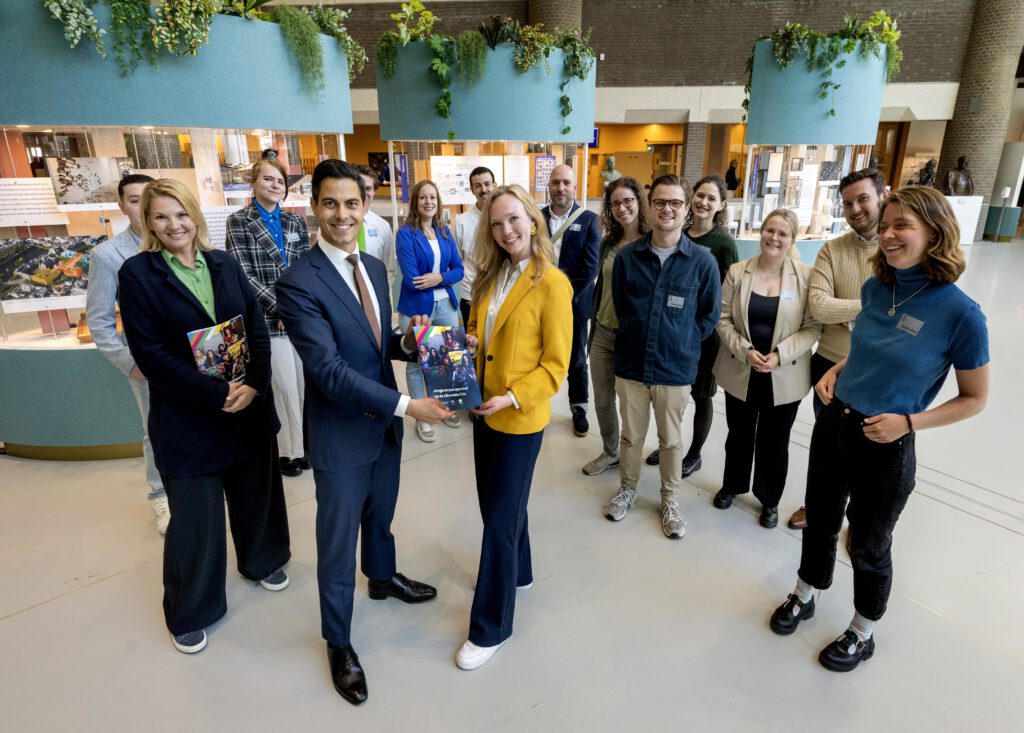YoungXperts manifesto on the climate crisis

Presentation of Manifesto to Minister for Climate and Energy Rob Jetten
On June 11, the YoungXperts team presented a manifesto (in Dutch) to Minister for Climate and Energy Rob Jetten, focusing on the youth perspective on the climate crisis. The climate crisis has significant consequences for everyone, particularly for young people who will experience the impacts more profoundly in their future.
Minister Rob Jetten (Leader of D66 and Minister for Climate and Energy) stated: “I speak with many young people who are worried about their future due to climate change. The Netherlands is already facing severe floods, hot summers, and failed crops. Let that be a message to the new coalition: do not hit the brakes now. Let’s tackle the climate task together. It’s good for the planet and our wallets.”

Over the past few months, researchers from the youth platform YoungXperts (part of the Erasmus SYNC Lab) examined young people’s perspectives on the climate crisis. Young people (aged 12-28) not only face problems in their daily lives but often see the solutions as well. They are, therefore, the experts on their own lives. How do young people experience growing up during a climate crisis?
Young People Want to Turn Their Concerns into Action
Most young people are aware of climate change; 79% indicated this in an online survey. About 56% of young people take actions in their daily lives against the climate crisis, such as lowering the heating or buying fewer items. Some young people experience lower mental well-being and worry about the future due to the climate crisis. However, the manifesto shows that young people can be ‘agents of change’ by turning their concerns into action. They want to collaborate with others for the climate and find that talking or taking action together helps alleviate their worries. This fits with adolescence, where friendships play an important role. Doing something together for the climate can also empower young people, potentially reducing the negative impact of the climate crisis on their mental well-being.
Professor Eveline Crone states: “The world is changing rapidly, and it is crucial that policymakers take young people’s voices seriously because it concerns their future. As scientists, we try to provide the knowledge and tools to make this possible.”
Climate Education is Very Important
Young people who take little or no action state that this is due to a lack of knowledge about climate change and not seeing it as a crisis. In some youth panels, it was mentioned that climate issues are not discussed in school, and young people themselves are calling for mandatory climate education in high schools.
Researcher Anne-Wil Kramer explains: “Climate education works best when integrated into existing subjects. The importance of climate change as a crisis is most apparent in subjects like social studies and citizenship, rather than just geography. This is because it’s important to have knowledge not only about climate change itself but also about how to deal with it, now and in the future.”
Young People Want to Participate in Decision-Making About Their Future
Finally, the manifesto shows that young people want to have a say in their future. Researcher Lysanne te Brinke: “During brainstorming sessions with young people, we discovered that they have many ideas about possible solutions to the climate crisis but often feel unheard by policymakers. If you feel that policies are not made with you in mind, you are less willing to change your behavior.” Therefore, young people advocate for demonstrably including the youth perspective in policy decisions on climate, for example, with a generational test.
Curious about the entire manifesto? Read it here!
Contact
Erasmus University Rotterdam
Mandeville Building T13
Burgemeester Oudlaan 50
3062 PA Rotterdam, the Netherlands

